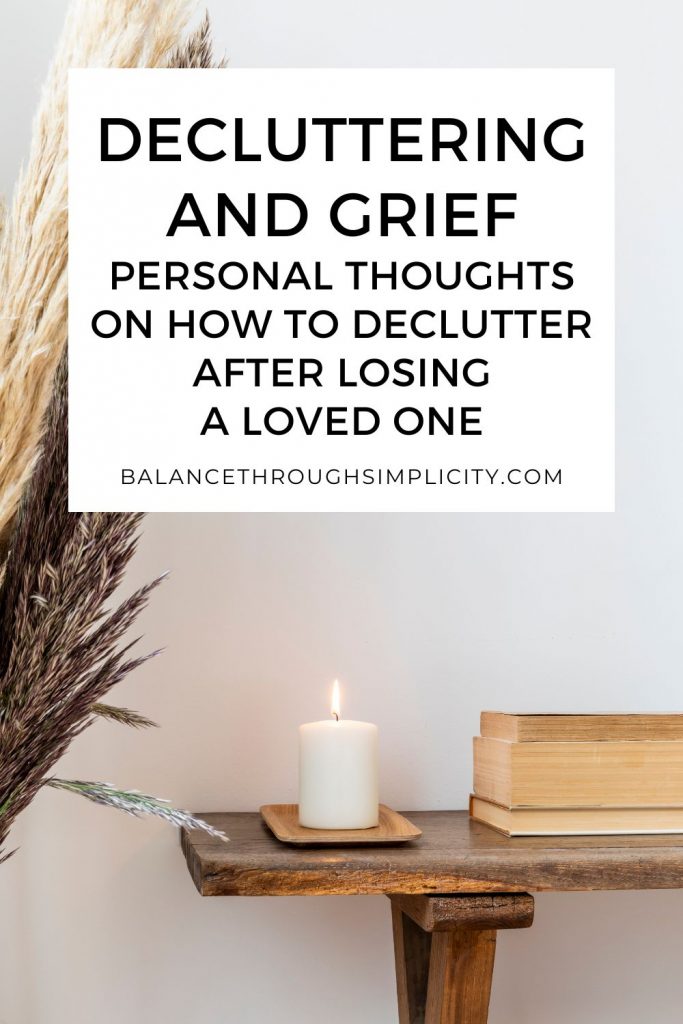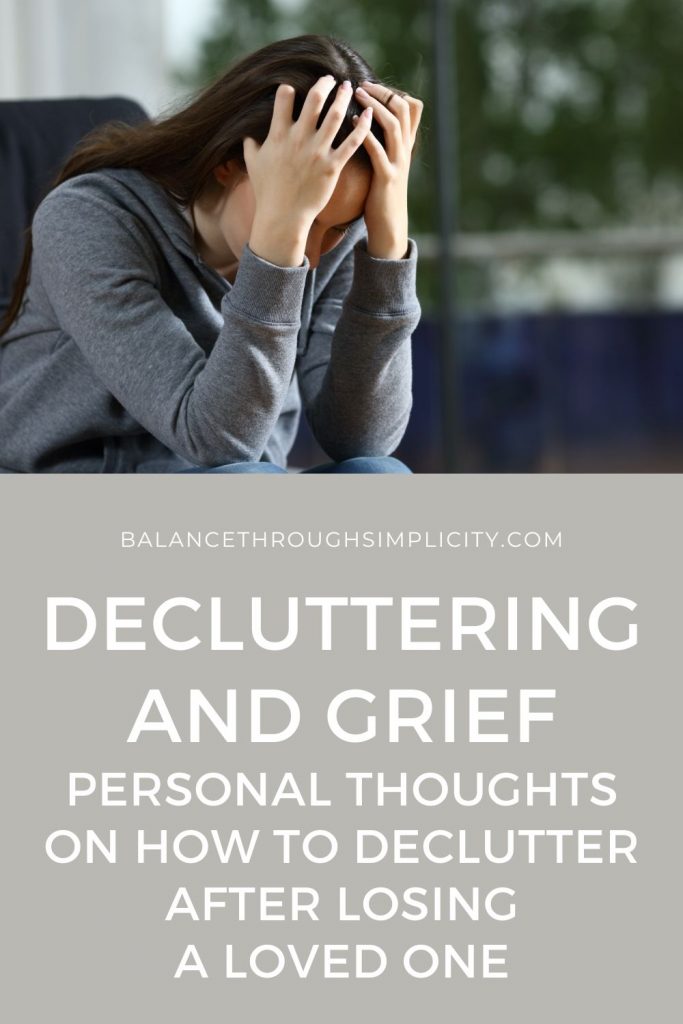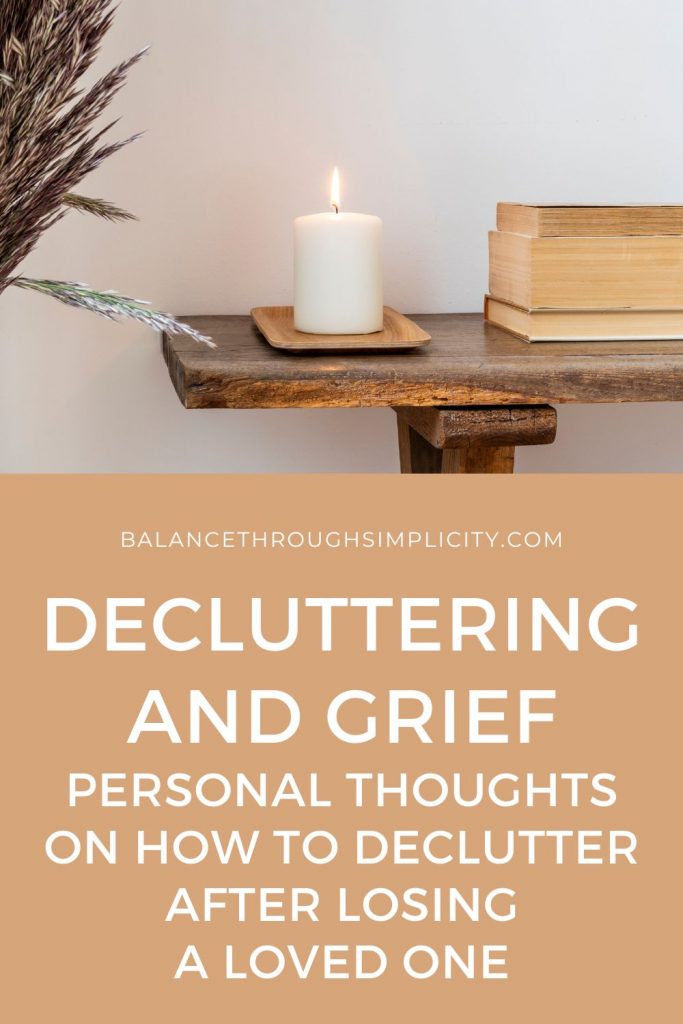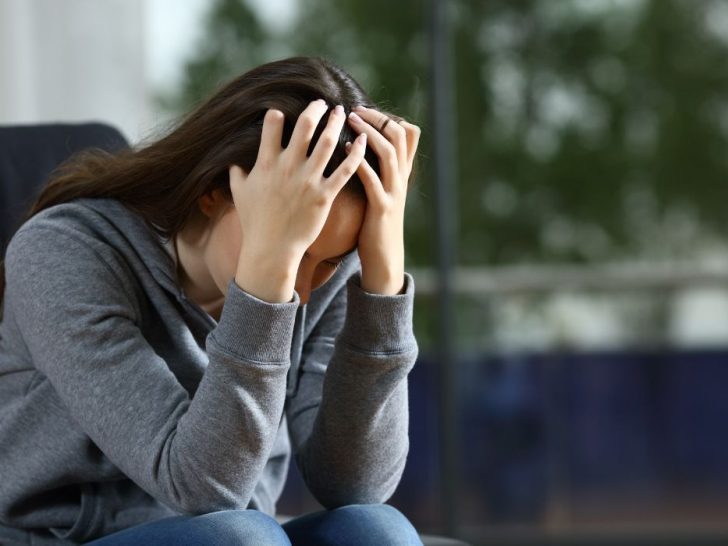DECLUTTERING AND GRIEF: A PERSONAL PERSPECTIVE OF DECLUTTERING AFTER LOSING A LOVED ONE
This is a difficult topic to write about but I feel it’s an important one. I wanted to share my own personal perspective of decluttering after losing a loved one and how decluttering and grief can together help us heal painful emotions and come to terms with life’s changes.
BACKGROUND
As I write this I’m surrounded by boxes ready to move home. A few years ago my mum became ill so my husband, kids and I sold our home and moved in with my mum. Yes it was tough, we lost our own space and a certain amount of freedom and independence, but being able to support my mum, in what turned out to be, the last few years of her life, was something I would do again in a flash. My kids got to spend time with their grandma and I got to spend time with my mum. Not snatched time in between busy life, but quality time amidst the ups and downs of dealing with life, illness and the bits in between.
I rarely post pictures of my home on my Instagram account, it wasn’t my home to share pictures of but after selling the family home (which has been in my family for over 70 years but that we now can’t afford to keep), I’m ready to embrace change, embark on a new chapter and see what life has in store for us next. You never know, pictures of our new home may pop up on my Instagram grid after all!
GRIEF AND A MEANINGFUL LIFE
I know there are various stages of grief, some days are better than others, and that memories change over time. This house we’re leaving represents many memories, some good, some not so good, but my mum and this house have always been so interconnected.
As I was growing up and finding my way in the world as a teenager and young adult, if I went to see mum, I came to this house. In later years, it’s where I would bring my kids to play in the garden and have tea in the living room. Mum would look after my kids when I was struggling to juggle it all as a full-time working parent and she would always provide wise advice to help me find my way. This house and the garden is where mum was in her element and she’d tend to the lawns, hedges and flowerbeds with love and care, no matter the weather. It was her sanctuary and her respite from caring for my dad for many years when he too was ill.
The house has seen it at all and mum’s life in it was full, rich and varied.
Grieving for the loss of my mum became grief for loss of my home. Then I think about the family members who sat around the table at birthdays and Christmas, the pets who we had as part of the family and the ornaments and artwork dotted around which remind me of family holidays and time spent together. Special times and special memories.
Time is fleeting, the way we remember things changes but life carries on for those of us left behind. And, as I write about simple and intentional living, I’m reminded again of why I love writing on this topic. It’s not to help you have a tidy, organised home (lovely as that might be), it’s to help you live a full and meaningful life and share the tools that I’ve found helpful in creating a life with more ease, joy and peace.
Grief may be tough but I believe it’s a powerful reminder to seize life’s opportunities every single day for you never know what tomorrow might bring.
In the words of Mary Oliver, “Tell me, what is it you plan to do with your one wild and precious life?”
DECLUTTERING AND GRIEF
Aside from the emotional effects of losing a loved one, there are often practical and logistical considerations too. One of these is decluttering and sorting through their stuff.
I don’t believe there’s a one-size-fits-all approach to decluttering, even at the best of times, but particularly not when it comes about because of grief and loss. There is no textbook way to grieve and no timescale to which you should adhere. Although there are some common shifts and stages, grief is highly personal.
HOW WE THINK ABOUT OUR STUFF
We hold onto stuff for so many reasons – guilt, comfort, anxiety, uncertainty, security and more. We hoard because we’re scared, we hold onto things because we’re frightened what will happen if we let go, we can’t afford to buy new or a replacement, we spent money on it already, it was handed down through generations, we seem frivolous to just get rid of it, waste is bad for the environment, we don’t know where to get rid of it. The reasons we come up with to hold onto our stuff are diverse, sometimes unfounded but often rooted in deeply-held patterns of thinking that we need to retrain our brain to think about in a different way.
My intention with this blog is never to push aside or belittle those emotions, it’s to help you simplify and declutter your home and life if this is something that YOU would like to do.
Decluttering a home because you have too much stuff is difficult enough, but often it’s to give you and your family a better quality of life with more time, space and freedom for what matters.
Decluttering items from a loved one who’s just passed away is an entirely different story. As well as all the challenges I’ve just mentioned, you’ve also got the raw and very painful emotions of losing someone close and having to deal with their personal, private possessions. It can be overwhelming and traumatic.
How we think about our stuff is key to how we deal with that stuff. Here are a couple of quotes that I’d like to share with you because they’re relevant…
“Our memories are within us, not within our things.” (The Minimalists)
Although I agree with this, I do know that sometimes ‘our things’ are a physical representation of a memory so not everyone shares this view. We worry that we’ll lose those memories so we hold onto the stuff as a reminder just in case. So, that’s why I also like to think of the following quote from Joshua Becker…
“We were never meant to live life accumulating stuff. We were meant to live simply enjoying the experiences of life, the people of life, and the journey of life – not the things of life.”
My mum would’ve liked this quote too because she enjoyed the journey of a simple life and always prioritised experiences and people over stuff. Maybe I was drawn to minimalism because of her.

DECLUTTERING AFTER LOSING A LOVED ONE
In this article I’m sharing a personal perspective of decluttering after losing a loved one. I’m sharing what I learnt and how it helped or made things more difficult, but the thoughts and ideas I share may be different for you. And that’s ok. Grief is complex, decluttering is hard. There’s no single approach to dealing with it.
1. Don’t rush
Take your time. I rushed to get the random stuff out my mum’s cupboards and wardrobe because I wanted to be doing something practical instead of having time to sit and cry. I wanted to being doing something not thinking about what I’d lost. Decluttering was an activity I could get on and do, I felt it was useful and proactive and I could put my grief to one side to deal with later. Of course, the result was that there’s a couple of mum’s things that I wish I hadn’t been so quick to get rid of but I know that now. If I’d let the process take a little longer, I could have kept these things back.
If you’re decluttering after losing a loved one, don’t rush, declutter slowly if you can and need. I understand wanting to get it over and done with and the physical action does take over the emotional pain for a while but that grief will still be there when you stop moving and doing. Take your time.
2. Be in the right mindset
When I was feeling very sad and emotional, I knew it wasn’t a good time to declutter. I would make decisions on what to keep and what to throw unwisely and I’d regret them later. Instead of using decluttering to help me grieve and heal, decluttering whilst overly emotional and upset would make me grieve and feel anxious, depressed and lonely.
Mindset is key to successful decluttering, no matter the reason for your decluttering. So, whether it’s because you have a busy life and are fed up of spending your precious free time managing your home, you’re decluttering before moving, decluttering in later life to downsize or free yourself from the past, how you think about decluttering your stuff will affect how well you declutter. Choose a time to declutter for a loved one who’s passed away when you can reminisce but think clearly about what you’re keeping and why.
3. Get help and support
A problem shared is a problem halved. Some of us might like to have space, time and privacy to grieve alone but for others, it may be helpful to have a friend or family member to help you. Chat through your decisions on what to keep and what to get rid of, laugh and cry and remember the past and get some physical and logistical support in actually getting the unwanted stuff out of your home. If you feel you might need help, do ask for it so you don’t feel alone in the process. Grief can make us feel alone but it can also bring us together.
4. Decide what you’re doing with the unwanted stuff
Sometimes we feel guilty about what we’re going to do with the unwanted stuff. We may decide not to keep the item ourselves, but we don’t want it going to landfill or cluttering up someone else’s life. I have an article on what to do with your unwanted items which shares lots of tips and ideas. Donating, selling, recycling and rehoming are all wonderful ways to breathe new life into old objects and feel less guilty or wasteful in the process.
5. What to do with items you’re going to keep
As part of the decluttering process, always try to consider what you’re going to do with the items you’d like to keep. Will you store them? If so, how and where? What about using them or displaying them in your home somehow? If so, where and how? Can you repurpose an item? Can it replace something you already have? Having a plan for what you’re going to do with the items you’d like to keep is always a helpful way to prevent the build-up of clutter in your own home.

6. Sentimental items
Decluttering sentimental items is always tough. When I’m sharing tips to make decluttering easier, I always suggest starting in an easy place, a place that’s relatively small and with no sentimental items to hold you up. The bathroom is a good starting point for decluttering because it’s usually one of the smaller rooms and it’s unlikely you’ll get sentimental about a nearly empty and squeezed out tube of toothpaste.
So, when it comes to decluttering the belongings of a loved one who’s no longer with us, then EVERYTHING feels sentimental. From their favourite mug or mixing bowl in the kitchen to the wristwatch they wore next to their skin every day. The stuff in our homes evokes feelings and emotions that seem out of context or bigger than they would otherwise be. That mug or mixing bowl are more than just a mug and mixing bowl. They might be symbolic of the chats you used to have and the laughter and tears you shared whilst your parent sipped warm coffee from their favourite mug, or the celebration cakes whipped up in that mixing bowl that marked the passing of the years and the bringing together of family and friends.
Our stuff is more than just our stuff so it’s not surprising that decluttering in grief makes every item feel sentimental. Be ready for that, be prepared for feelings of hurt and loss, but also open to happiness and warmth. Don’t be scared of dealing with sentimental items, cherish and appreciate them but know too that we can’t and don’t hold on to people just through the ‘things’. We hold onto them into our hearts and minds too.
7. Using a memory box
I sifted through a lot of my mum’s stuff (and my dad’s that she hadn’t parted with). I kept some, run my hands through the rest, gave it a hug and said my goodbye’s. I didn’t need to keep everything to remember my mum and dad, I kept the items that were the most meaningful and important to me. I wanted to remember my parents but bring the best of them with me into the new chapter of my life, not just drag everything around with me for years to come through fear or worry. To make it more poignant, I also knew that losing my mum would mean her house (and my home) would need to be sold so I had to decide what to do with the items from her that I’d like to keep.
My solution was to create memory boxes, one for mum, one for dad, one for my husband, one for myself and one for each of the kids. They’re pretty large because I didn’t have the energy or inclination to pare things down to their bare minimum right now. But, we have one box per family member and that’s enough to store our most favourite memories. School reports, photos, drawings, ornaments and anything else I don’t want on display or to use but that I don’t want to part with. One box for each of us to be stored in our garage. No more and no less. Once a box becomes full then I can sift through again with fresh eyes, heart and mind and see what to keep and what I’d like to let go of.
8. Windows of time
Decluttering can be physically and emotionally draining so I found that blocking out little windows of time to declutter my mum’s stuff to be best for me. Five minutes here, 20 minutes there. Little and often makes decluttering through grief more practical and less overwhelming.
9. Be prepared beforehand
Just like I mentioned above about getting into the right mindset, there are other things you can do to prepare beforehand. Plan your piles for donating, recycling, selling and throwing away. Get some rubbish bags or empty boxes handy, have a drink and some music on in the background. Make it as stress-free and easy as possible.
10. Talk through your feelings
If you’re worried or anxious about decluttering, chat with a loved one or someone you trust. Ask what they would do or have done in a similar situation. What made it harder or easier for them? It’s always helpful to get a different perspective and swap stories so you can get some helpful tips but also to know you’re not alone. This is, unfortunately, a process that many of us have to go through at some time in our lives.
11. Put things in a box and check back in a while
If you come across an item or two that you’re not ready to declutter (or even think about), just put it in a box and come back to it another time. Some items knock the wind out of our sails and we’re not prepared for the emotional response they produce. Don’t let this hold you up. Acknowledge that grief is a process and it takes time. Some days are worse than others, some reminders are more painful or triggering than others. But it’s all part of the process and the more you face up to the emotions and acknowledge their presence, the more you’ll learn how to deal with them.
12. Choose your favourites and let go of the rest
I couldn’t keep all of my mum’s things and I didn’t really want to. Instead I chose to keep my favourites and these will stay with me as I continue in life. I don’t want to heave all my memories of my mum around me like a big bag I’m pulling over my shoulder, I won’t get anywhere that way. But, I do want to remember my mum with a smile and happy tears, a life with no regrets, lots of fun, wisdom and meaningful memories that will remain in my heart from one day to the next. I want to look ahead to what life has to offer next, not constantly check behind me that I’m still dragging that heavy bag over my shoulder.
Decluttering and grief is about choosing your favourites to remember that person by and letting go of the rest. I guess it’s also a way of filtering the good bits and saying goodbye to the bad. You get to decide (and maybe even control in some way) which memories and things to keep vs which to let go of.

13. Donate to a special charity or cause
If your loved one had a special cause or charity they supported then maybe you could sell some of their items and donate the proceeds to charity. This can be a helpful way of getting rid of some of their stuff you don’t want to keep but that supports a cause they cared about in their lifetime.
14. How to display your kept items
If the items you’re keeping aren’t going to be stored somewhere, have a think about how you can display the items instead. This will avoid them being dumped somewhere to be dealt with later, or never… We use my grandma’s fruit bowl on our kitchen counter as our own fruit bowl so I remember her every time I look at it. Take some time to consider where you’d like to display your kept items and if you can’t decide on where to display or store them, do you really want them enough to keep them? Your home is for living in now, not a storage space for items from the past.
15. Enjoy the process
In a weird way, I ended up enjoying the process of decluttering my mum’s stuff. When I turned my thoughts away from just going through her belongings now that she’s passed away, and instead towards curating a collection of my best memories of her that I could cherish every day, then I started to enjoy the decluttering process. It wasn’t instant and it wasn’t always constant, but over time, I learnt to make the most of choosing which items to keep and honoured that I was the one to do that for her. They remind me of my mum, the lessons she taught me, the values she held, the interests, people, places, colours and experiences that she held most dear and that she’d gathered during a life well lived.
Decluttering through grief is a difficult and challenging process but it also helped me process my thoughts and feelings around loss and what life is all about. I enjoyed it as a learning experience and seeing decluttering and grief as a cathartic release of emotion.
SHARE YOUR THOUGHTS
I hope you found this article on decluttering and grief helpful if you’re currently decluttering after the loss of a loved one. Decluttering and grief can be emotive topics on their own and can bring up emotions that we didn’t know were there, let alone know how to deal with. Give yourself time and space. Don’t rush, lean into the process so that you’re not fighting it.
Grieve, cry, laugh, remember and allow your feelings and thoughts time and space to show themselves. This is how we learn to deal with tough times, remember and learn from the past and heal for the future. Not easy, I know, but it’s a part of life and can be a beautiful way to honour our loved ones.
How did you manage to declutter through grief after the loss of a loved one? What did you find hard and what helped you through it? What did you learn and what would you do differently if the situation came about again? I’d love to hear from you so if you have any thoughts to share which might help others going through a similar experience, please leave a note in the comments.
MORE ARTICLES TO HELP YOU DECLUTTER
- Decluttering in Midlife: How to Declutter in Midlife With Ease – Midlife is a time of change and transition. Whether you’re downsizing, moving home, want to free up time and energy or just want a fresh start, here are some tips on how to declutter in midlife with more ease and less stress.
- The Cost of Clutter: What Is Your Clutter Costing You? – Clutter can take up space in our home, heart and mind but what else is your clutter costing you? In this article we look at the cost of clutter so you can decide for yourself.
- Decluttering Mindset: How to Get Into the Right Mindset to Declutter – Most of the actions and decisions we make and take come down to our mindset and how we feel and think about something. In this article I explore some decluttering mindset tips and how to get into the right mindset to declutter with confidence and ease.

